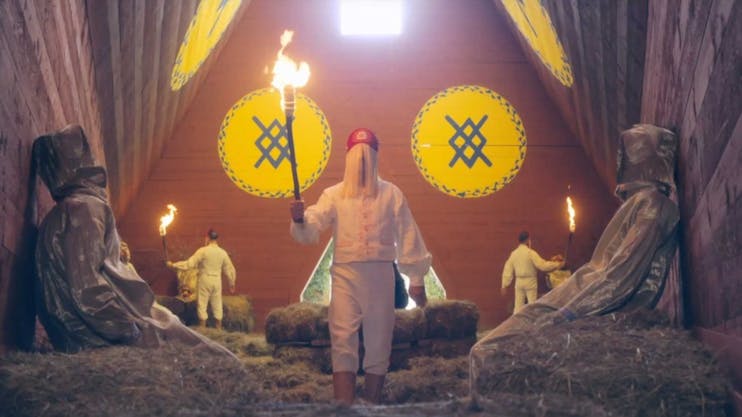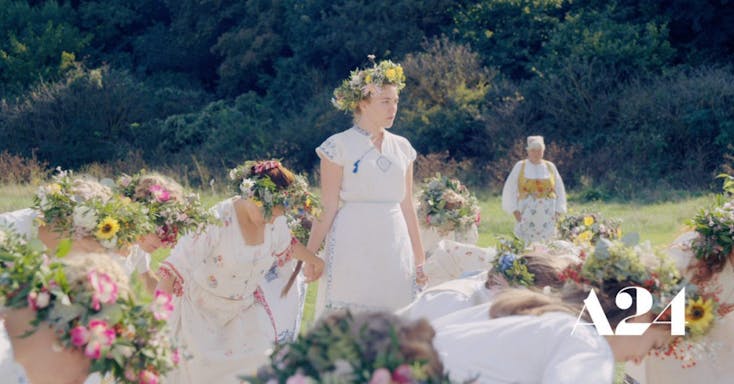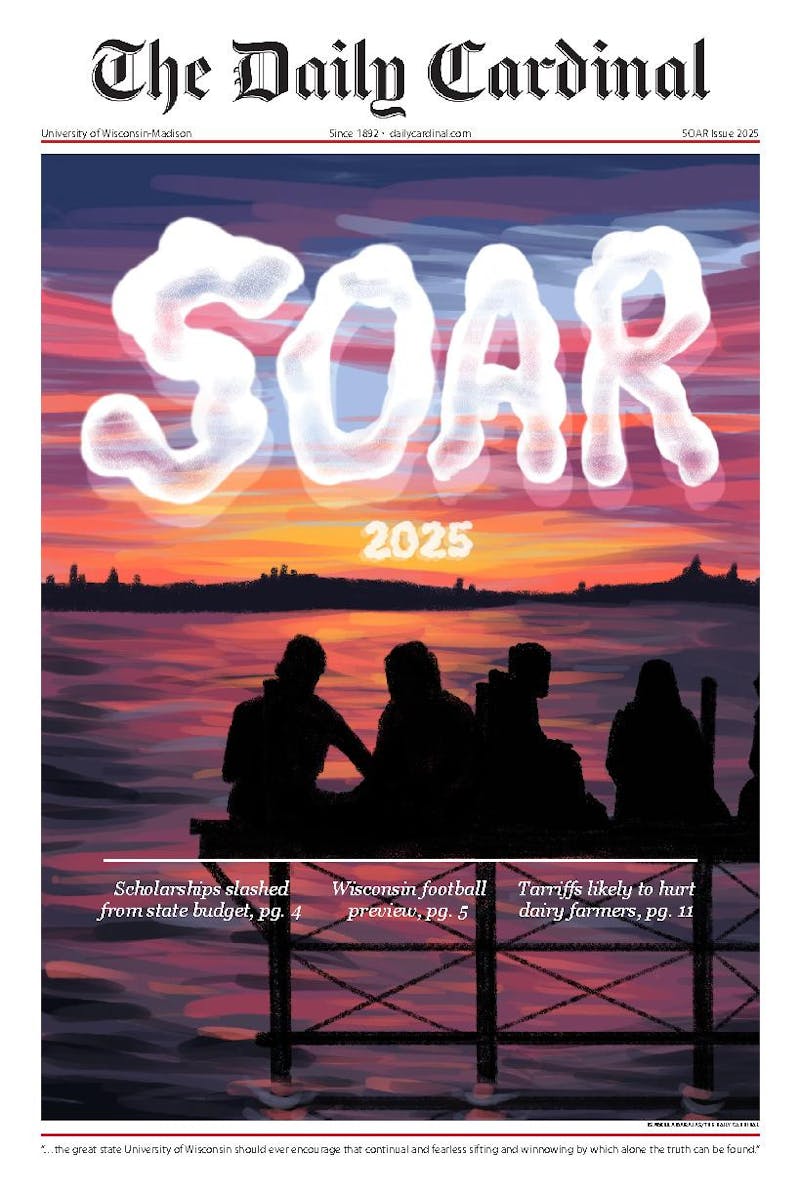Every summer in Scandinavia, Europeans celebrate the summer solstice with an array of festive activities, such as traditional dancing, gourmet cooking, and lots of drinking. Extravagant clothes are worn, music is played, and sometimes pagan rituals are practiced during the longest day of the year, where sunlight is constant and the celebrations are continuous for weeks.
This ongoing festival known as Midsummer is still an incredibly popular occurrence throughout all of northern Europe, where countries such as Sweden celebrate it as their national holiday. This seemingly harmless party was once practiced back before the origination of Christianity, in which brutal acts of human sacrifice and ritualistic violence occurred in order to worship either mother nature or various gods, including Jesus Christ at certain points in human history.
After last year’s horror knockout “Hereditary,” director Ari Aster has topped his disturbing first feature by centering the Midsummer festivals as the topic of his latest horror nightmare “Midsommar.” This is a film I had been looking forward to seeing tremendously due to how “Hereditary” shook me to my core and kept me enthralled from start to finish. Now, with “Midsommar” Ari Aster has crafted yet another ingenious horror film, this time delivering another brilliant piece of cinema that became too disturbing due to his imagery at times.
Let me be frank by stating that “Midsommar” is the single most atrociously disturbing film I have ever seen, both due to what is and isn’t shown on screen. Aster is too liberal in what he shows on the screen, depicting the most gruesome act of violence shown on film that I have ever witnessed. While there are only two scenes that actually depict ritualistic violence, “Midsommar” grabs you by the throat and refuses to let go, overwhelming your senses with a constant shred of dread, acting like a car accident that you know will haunt you, yet you can’t turn away from.

The film follows Dani, a young woman plagued by an unspeakable family tragedy, who travels to Sweden with her selfish boyfriend Christian and his fellow anthropology graduate student friends in order to study the traditional festival in one of their friends’ rural communes. Dani and Christian have a failing relationship yet she attends the festival anyway in order to escape from her harsh reality, thinking a peaceful few weeks in the beautiful Swedish countryside will help her move away from her trauma. Turns out, Dani couldn’t have been more wrong. She and her American travel companions soon realize that the village practices ancient traditions in tribute to the circle of life, their culture one of barbaric savagery and evil.
What keeps “Midsommar” together is actress Florence Pugh’s remarkably fierce performance as Dani. Pugh gives her character a defensive charisma that she tries to use as protection against her vulnerabilities while simultaneously exposing Dani’s fears. She does a perfect job of expressing raw emotion and is able to act genuinely horrified by what her character is going through, a rare talent found in very few actors, especially in horror films.
It’s important to note that this is not a film for mainstream audiences and is definitely not for everyone. If not immediately turned off from the scene I referred to earlier in which we see a graphic and grisly suicide (two people walked out of the theatre when this occurred), many will be put off by the fragile and delicate pace that Aster composes. Aster wants us to feel comfortable before taking advantage of us as a director. Having his film take place almost entirely in bright daylight while surrounded by beautiful scenery and slowly unfolding the terror allows the filmmaker to manipulate us as an audience and secure a false sense of comfort before overwhelming us in horror.

However, Aster uses his pacing to his advantage and makes the film far more effective. By taking the time to get to know Dani, we root and feel for her as a protagonist and are generally concerned for her safety and emotional state. Aster creates a vibe as a director that is intoxicating. We are constantly feeling a sense of uneasiness and are desperately awaiting what is next to come out of fear of being further disturbed. Using artistic editing and stunning cinematography to its advantage, the film presents a visually captivating array of images that wake the purest of emotions in us. I literally felt numb during several moments of this film due to how disturbed and unnerved I was at not only some of the hauntingly realistic and graphic images displayed on screen but by the fear of the unknown.
It’s easy to say that Ari Aster is one of the most effective directors of our time. He’s a filmmaker who wants his audience engaged with his work in each and every second, using storytelling techniques such as foreshadowing and eye for detail brilliantly. Few filmmakers who contribute to the horror genre are able to make their films feel so real, which is why Aster is a natural master of horror. We’re terrified and disturbed by his films because they feel like realistic plots, as opposed to obvious fictional situations that, while entertaining, don’t resonate and affect us as much. Additionally, Aster uses true-to-life scenarios to demonstrate the horrors of reality, in this case the relationship between Dani and Crhsitian. Aster even wrote the script while recovering from a breakup, his real life trauma incorporated into his art.
I can’t say that I can recommend this film due to how hardcore it is and how viciously disturbing it is. While “Midsommar” was by far one of the most memorable movie-going experiences of my life, most will be mortified by what they see. While I am haunted by some of what I saw in this film, I’m glad I saw it. It’s a film that got not only an enormous reaction out of me but kept me more entertained than almost any film I’ve ever seen. To be honest, I wanted the film to end at times due to how traumatic it was, yet once it ended, I wanted more.

Despite including the most hideously violent scene and the most uncomfortable and warped sex scene in film history, “Midsommar” is a truly unforgettable experience that will haunt you for weeks. While I felt these two scenes could have been much tamer and less barbaric and strange, “Midsommar” is even more mortifying than I expected, a description that, while normally would sound like a criticism, is the highest praise a psychological horror film could get. Ending profoundly and incorporating rich themes centered around human growth and the harsh nature of life, you won’t know what hit you.
“Midsommar” is by all means a messed up and hard to watch film, but it’s because of this that it’s so captivating and haunting. Simply put, this is one of the most unforgettable films of the 21st century, one I doubt I can handle seeing again, but memorable in the purest of senses.
Final Grade: A+
Dominic LeRose is a staff writer for the Daily Cardinal. To read more of his work, click here.






